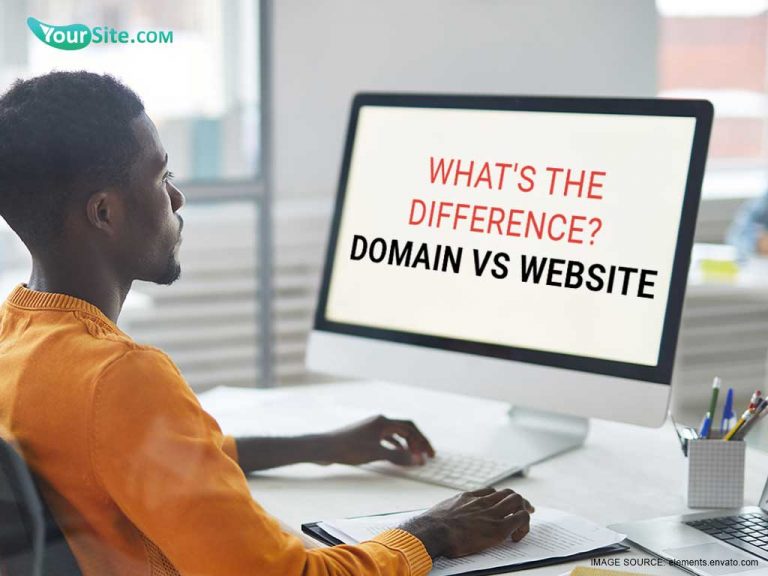There is a special relationship that exists between a domain and a website. They are intricately tied to each other and you need both and a web host, of course, to establish and maintain a presence on the web. The close relationship they share has resulted in them being mistaken for the same thing, but they are actually quite different things, with very different functions.
We explain those differences and how web hosting brings your domain and website together to create unique spaces on the web.
Table of Contents
What is a domain?
A domain or a domain name, as it is frequently called, is an internet address. It’s what is used to recognize email addresses and emails. The domain for this website, for example, is monsterhost.com. For email purposes, gmail.com would be the domain. A domain is what’s entered in the URL bar on the browser, when you are trying to locate a particular website.
In the same way your home address helps mail come to your home, a domain name sends users to a particular website.
What exactly is a website?
It is a compilation of files, date, pages and images that you see when you enter a domain name into your web browser.
Put another way, a website is content that’s assembled under the same domain. Think of a domain and a website as a store where the domain is the name of the business and the website is your actual store that houses the products you are selling. In summary, a domain is your website’s name while the website is the content that visitors see and interact with when they enter your domain in a browser.
Can a domain name exist without a website?
We mentioned that domains and websites share an intricate relationship, but it’s not necessarily an equal one. While one can exist without the other, the other cannot.
So you can have a domain name without a website, but without a domain it’ll be virtually impossible to have a fully functional website.
1. How do you register a domain?
There are two main options to choose from.
- A web host provider
- A domain registration company
- A web host provider
Websites are hosted on the internet through what’s called web host providers. These are businesses that provide you with the technological skills and services required to ‘host’ or make your website visible on the internet.
Web host providers often offer additional services such as web based backup plans and website monitoring software. In a couple minutes and with a few simple steps, web hosts will also show you how to make your own webpage.
Their overall aim is to take the hassle out of creating and maintaining a website and so it’s no surprise that they are a convenient way to get a domain.
2. Use a domain registration company
A domain registration company is your other option and it comes with a number of advantages and disadvantages. An example of a disadvantage would be that the process is long and time consuming. However when it comes to pricing, the registration process may end up being cheaper.
Whether you choose to use your web host or a domain registration company, here are some of the basic things to look out for. Ensure it’s accredited by a governing body, has an established reputation; protects your private information, great customer support and no hidden fees.
How to get a website
Remember how we said you can’t have a website without a domain? It’s still true. So after you selected your site name and procured your domain, the next thing is to launch your online presence.
But this requires you to find a web host with whom to register your site’s domain and then create the actual site.
So it’s really the web host that makes the dream a reality; it’s the glue. Without it, the domain and website lay dormant; web hosting is what brings them alive.
How to set up a website
At this point, most of the work is done, because after you decide on a web host, all you have to do is use simple, do-it-yourself website builder software, such as the easy sitebuilder. This is when you get to decide the look and feel of your site and your web host will give you different free templates that you can tweak to achieve your desired result.
You can also purchase a template from other sources and integrate it on their site. Pair that with some digital content, like:
- Text – the purpose and type of website you have will determine what you write on it.
- Images – Whether you use these to tell stories, paint a picture or just enhance a post, ensure they are high quality. If they are not your original photos, ensure you have permission to use them.
- Videos – Make them relevant and relatable and the same principle for photos, apply to videos.
- Other media – If there are other forms of media that help you accomplish the goal you’ve set for your website, feel free to procure them.
Using website builder software is easy and hassle free, but if you have the skills and time, you can code your site from scratch. If you don’t have the skill or time, but have the funds, you can hire a website builder/designer to create one for you.
Whichever option you choose, ensure your site represents you and your business, is user friendly and safe to use. Installing an SSL certificate is one of the surest ways of securing your site.
Summary
It’s clear that domain and websites are not the same things. They were created for and serve different purposes and while the domain can exists without a website; the website isn’t that independent. However, it’s also very clear that you need both, along with a web host provider, if you aim to create an online presence through a website.






